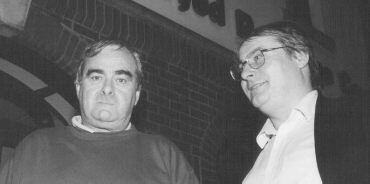![[LFB newsletter] [Freelance]](gif/fl0clear.gif)
Ed's free, but watch your back |
 |
|
Ed Moloney (left) and Freelance Organiser Bernie Corbett outside a Belfast Trades Council meeting supporting Ed |
|
ED MOLONEY, Northern Ireland correspondent of the Sunday Tribune, is freed from the threat of jail. On 27 October the High Court in Belfast overturned wan order which would have required Ed to hand over confidential interview notes - or go directly to jail. But other journalists who have covered events in Northern Ireland, including freelances, should expect more demands to give up confidential material. Freelance National Executive member Kevin Cooper told the November London Freelance branch meeting that "The only reason this judgement was obtained was that the courts in Northern Ireland knew that the world was watching them. Statements of support for Ed, including those from LFB and Freelance Industrial Council - which responded before the rest of the union - were important to ensuring the courts knew people are concerned with human rights." Kevin was gratified how well other trades unionists in Northern Ireland understood the issues and how readily they offered support. The case concerned an interview Ed did with William Stobie, who was charged with the murder in 1989 of solicitor Pat Finucane. Ed promised to keep the interview confidential until Stobie got into trouble - and published a page-and-a-half in the Sunday Tribune when he was arrested. Clearly there couldn't be much left in the notes. But for any journalist to break the confidence of a source alleged to be involved both with paramilitary groups and with British Intelligence could endanger the lives of all journalists. Fortunately, the nature of the Appeal Court finding "raises the barrier for proceedings against journalists in Northern Ireland," Kevin said. Until now, mere suspicion by a police officer had often been sufficient to get a court order. Meanwhile, the new inquiry into the Bloody Sunday shootings is likely to issue more orders against journalists. It has already asked the NUJ for the addresses of 13 journalists - three of whom were 11, 10 and unborn at the time of the 1972 killing of 14 people in Derry. General Secretary John Foster responded that the union's Code of Conduct prevented it disclosing confidential information. |
 Background on the case
Background on the case
|
Nov/Dec 1999
![[Go to NUJ.LFB home] [NUJ.LFB home]](gif/nujsma.gif)
![[Media Unions home]](gif/mediasma.gif)
![[CCC home]](gif/ccc1.gif)
© 1999 NUJ & contributors
![[The Freelance: contents]](gif/fl1.gif)